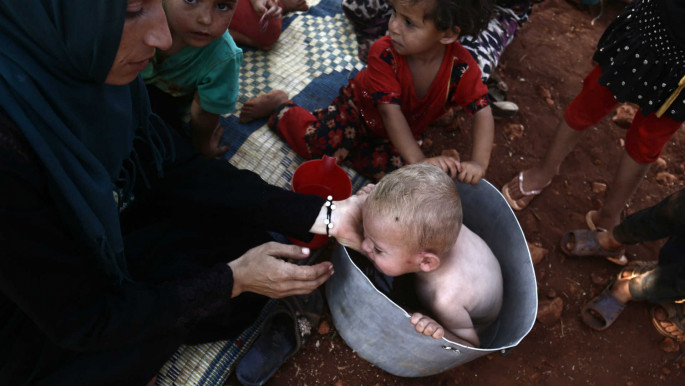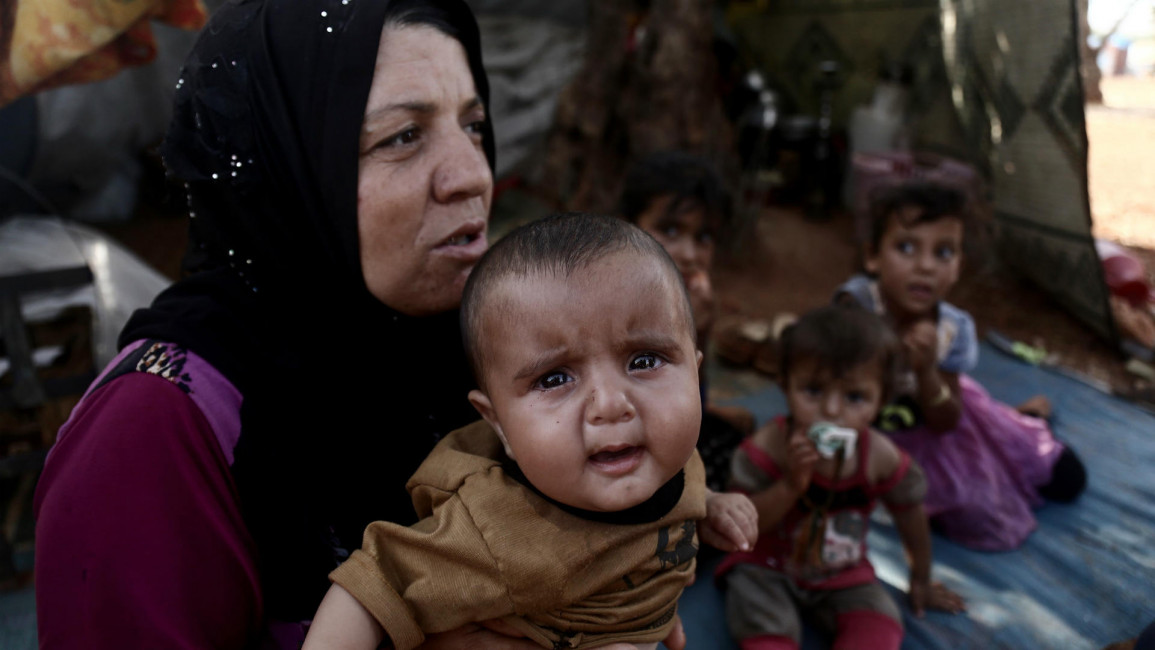More than 40,000 displaced Syrians in Idlib contract tropical disease 'due to weak UN response'
More than 40,000 displaced Syrians in Idlib contract tropical disease 'due to weak UN response'
Humanitarian organisations are blaming the UN's 'weak response' for poor sanitary and housing conditions among hundreds of thousands of displaced people in Syria's Idlib.
3 min read
Between 600,000 and one million displaced Syrians are at risk [Anadolu]
More than 40,000 displaced Syrians in the country's northwestern Idlib province have contracted a deadly tropical disease in the past two months, an expert said on Wednesday.
Hundreds of thousands have been displaced from southern Hama and northern Idlib since late April, when the Syrian regime and its Russian ally launched a fierce aerial and ground campaign to recapture the rebel-held bastion.
Around half of the 3 million strong population of Idlib have already been displaced from elsewhere in Syria.
The lowest UN estimate says around 576,000 - half of them children - have been displaced by the regime offensive to retake Idlib, while the Syrian Response Coordination Group puts that figure at around one million.
Humanitarian organisations say those fleeing regime and Russian aerial bombardment are being forced into refugee camps that are already hosting mutliple times their capacity.
That means displaced Syrians are facing near catastrophic conditions as humanitarian organisations are unable to access the requisite funds to cope with the sheer numbers of refugees.
Hundreds of thousands have been displaced from southern Hama and northern Idlib since late April, when the Syrian regime and its Russian ally launched a fierce aerial and ground campaign to recapture the rebel-held bastion.
Around half of the 3 million strong population of Idlib have already been displaced from elsewhere in Syria.
The lowest UN estimate says around 576,000 - half of them children - have been displaced by the regime offensive to retake Idlib, while the Syrian Response Coordination Group puts that figure at around one million.
Humanitarian organisations say those fleeing regime and Russian aerial bombardment are being forced into refugee camps that are already hosting mutliple times their capacity.
That means displaced Syrians are facing near catastrophic conditions as humanitarian organisations are unable to access the requisite funds to cope with the sheer numbers of refugees.
Lack of shelter and poor sanitary conditions have led to around 43,000 people contracting leishmaniasis, a sometimes-deadly tropical disease, in the past two months, Hisham Dirani told Syrian independent news site al-Jumhuriya.
Dirani, co-founder of the BINAA Organisation for Development, said the lack of clean water and bathing facilities for hundreds of thousands of displaced people in Idlib had caused the skyrocketing levels of disease.
Read more: Syria Weekly: Regime advance in Idlib threatens genocide of Syrians
Read more: Syria Weekly: Regime advance in Idlib threatens genocide of Syrians
Leishmaniasis is a disease spread by sandfly bites that can cause skin ulcers and liver and spleen enlargement, among other dangerous symptoms.
 |
| Many of the displaced are living outdoors with no access to clean water [Anadolu] |
The disease is relatively rare in developed countries and can be easily prevented with the use of insecticides and insecticide-treated nets while sleeping. According to the World Health Organisation, poor housing and sanitary conditions such as those seen in ad-hoc refugee camps in Idlib can increase sandfly breeding and resting sites and thus the risk of contracting leishmaniasis.
Dirani said the response from the UN, whose Syrian Cross-border Humanitarian Fund has failed to acquire more than 28 percent of the requisite funds so far this year, has been "very weak".
"There is insufficient funding, especially for the truly urgent needs of IDPs, such as shelter, clean water, and toilets, first and foremost," he said. "In the last allocation of emergency funding, there was not enough set aside for the provision of these needs; instead, the funding was reallocated to fuel, heating, and consumables."
Dr Mohamad Katoub, head of advocacy in Turkey for the Syrian American Medical Society (SAMS), told al-Jumhuriya that the humanitarian response in Idlib so far had been provided by "humanitarian organisations' own reserves", rather than the UN.
"The UN has only provided 9,000 tents, without allocating any monies for the basic needs of these tents' inhabitants, like drinking water, household water, and sanitation," he said.
"Despite the fact the current wave of displacement in northern Syria is the largest since the war in Rwanda, it has nonetheless met with the weakest response."
Airstrikes in Idlib have killed more than 900 civilians since late April, including 237 children, according to the UK-based Syrian Observatory for Human Rights, and the fighting has left more than a thousand fighters on each side dead.
Airstrikes in Idlib have killed more than 900 civilians since late April, including 237 children, according to the UK-based Syrian Observatory for Human Rights, and the fighting has left more than a thousand fighters on each side dead.
At least 13 people were killed on Wednesday when Syrian regime warplanes struck a city in southern Idlib province, according to local activists.
Among those killed in the airstrikes on the city centre of Maarat al-Numan were six children, according to the Syrian Civil Defence. A further 34 people were injured.

![Squad incumbent Summer Lee has won her district's Democratic primary. [Brooke Anderson/The New Arab]](/sites/default/files/styles/image_330x185/public/2024-04/413898031_1041031157158522_8195934720767720634_n%20%283%29.jpg?h=ff8c3fa3&itok=75Sx6fbL)

